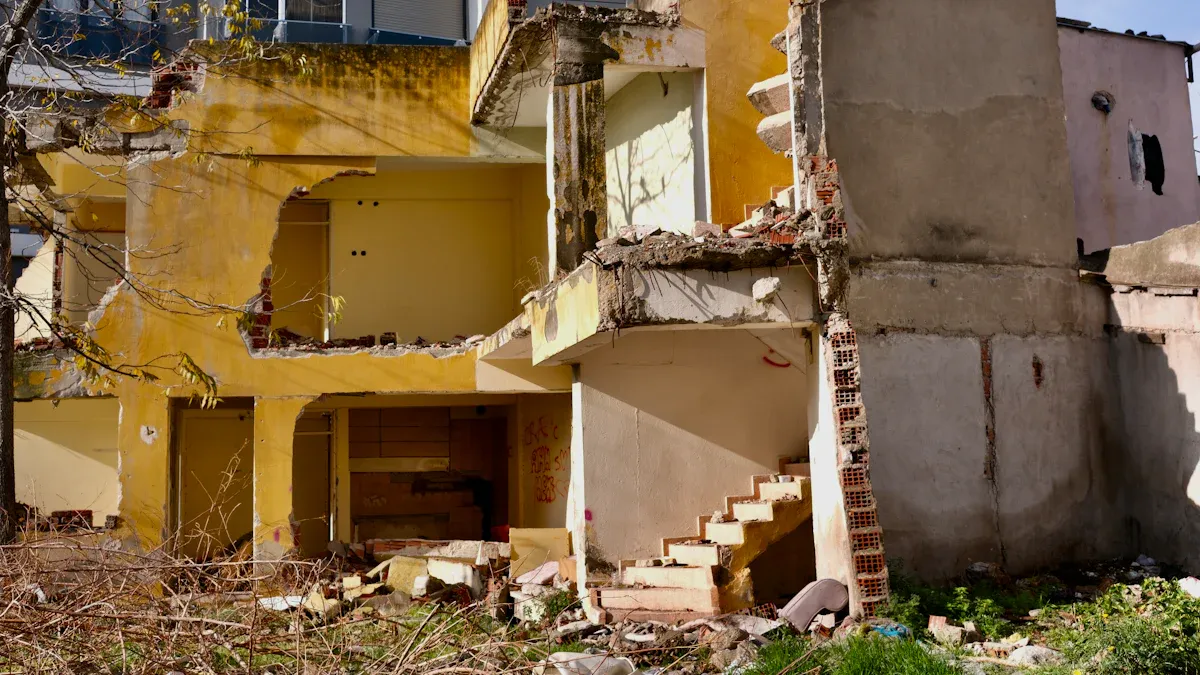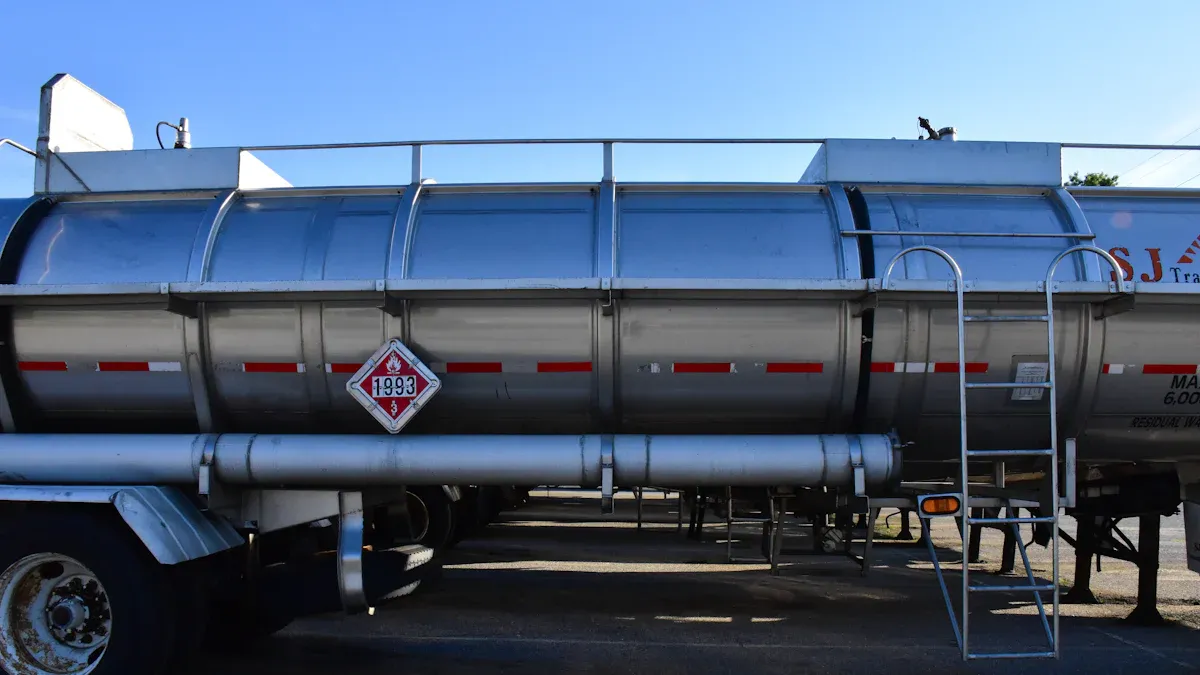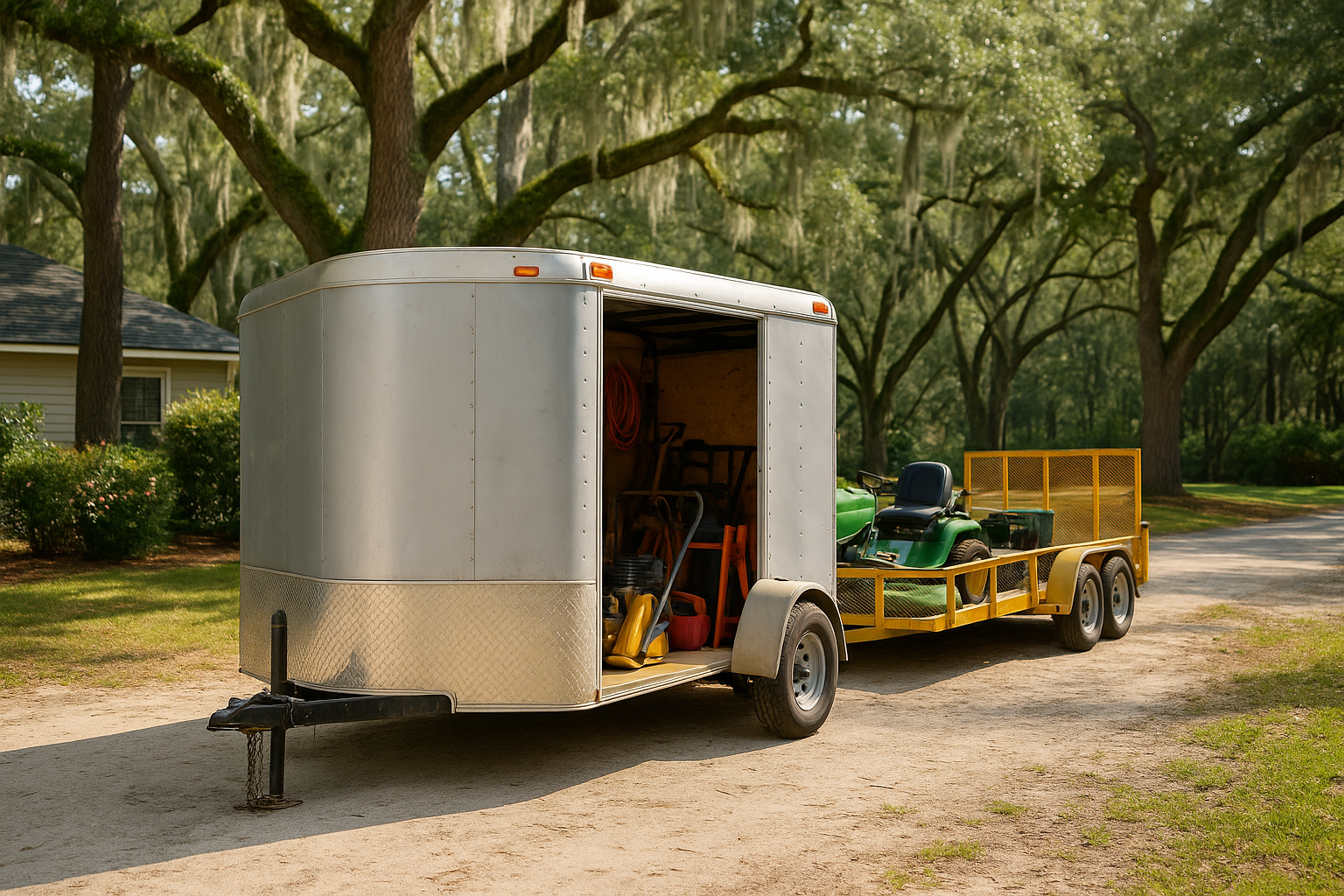
Imagine you have a landscaping business in Bluffton. One day, you go to work and see your trailer is missing. All your gear was inside the trailer. Maybe you own a Buford food truck. You keep your equipment in a rented unit. When you need it, you find it is gone.
TL;DR: Business personal property insurance covers things at your business address. It does not cover things away from your business. Inland marine coverage can protect your tools and equipment. It also helps with mobile operations.
You want to know where your coverage stops. If your equipment leaves your main address, is it still protected? Local business owners in Beaufort and Gwinnett ask these questions every day.
Key Takeaways
Business personal property insurance covers things at your main address. If you take equipment to a job site or storage, it might not be covered.
Inland marine coverage is important for businesses that move equipment. It protects tools and gear when you move them, at job sites, or in storage.
Always look at your insurance policy for things it does not cover. Knowing what is not covered helps you avoid expensive problems when you make a claim.
List your tools and equipment on your inland marine policy. This makes sure you have coverage for everything, even rented or borrowed equipment.
Check your insurance needs often, especially when you are busy. Change your coverage to fit your business as it grows or changes.
Business Personal Property Insurance Coverage
Premises Limitation Explained
You want to keep your business stuff safe. But you need to know where your insurance works. Most business personal property insurance only covers things at your business address. If you have a landscaping company in Bluffton or a food truck in Buford, your tools and equipment are safe at your main spot. If you move them to a jobsite, storage unit, or take them somewhere else, your insurance might not help.
Insurance companies have rules about where coverage works. Here is a simple table that shows how they explain the premises limitation:
Coverage Type | Description |
|---|---|
Off Premises | Covers property at places not owned, rented, or run by you, like fairs and exhibitions. |
Newly Acquired Property | Gives up to $100,000 coverage for new places for up to 90 days. |
Limitations | Does not cover property in vehicles or with salespeople unless at a fair or exhibition. |
Most policies do not protect things while moving or at temporary places. For more details, you can look at resources from the Insurance Information Institute or the SBA.
What’s Included and Excluded
Business personal property insurance covers lots of things, but some important items are not covered. You should know what is included and what is not. Here are things that are usually not covered:
Money and securities, accounts, bills, and food stamps
Animals except for stock
Vehicles, aircraft, or watercraft (sometimes there are exceptions)
Land, piers, wharves, docks
Crops, grain, or hay outside
The cost of digging, grading, or filling back in
Building foundations, paved walkways and roads
Electronic data and the cost to fix information on important records
If you keep cash in your food truck or store gear in a trailer, these things might not be covered. Always read your policy and talk to your agent so you understand your insurance.
Common Exclusions and Coverage Gaps

Off-Premises Risks
You might think your insurance protects your stuff everywhere. But it often does not help when your things leave your main address. If you have a landscaping business in Bluffton or a food truck in Buford, you face risks when you move your equipment. Bad things like theft or fire can happen at job sites, while driving, or in storage units. Floods or hurricanes can hurt your property when it is not at your business. Knowing what your policy does not cover helps you find problems before something bad happens.
Here are some common exclusions small businesses talk about:
No policies or endorsements for certain risks
Risks like flood damage or worker injuries while traveling
Bad things and natural disasters can happen anywhere, not just at your main address. You need to know where your coverage stops and where exclusions start.
Job Sites, Transit, and Storage Units
When you bring your tools to a job site in Beaufort or keep equipment in a Gwinnett unit, you face new problems. Business personal property insurance often does not cover things while moving or stored away from your business. Theft, fire, or tornadoes can ruin your stuff when it is not at your main spot. Knowing what your policy does not cover is important. Common exclusions are things in vehicles, trailers, or temporary storage.
Ask yourself these questions:
Is my equipment safe while I drive to a job?
What if a natural disaster hits my storage unit?
Are there exclusions for disasters at job sites?
Bad things and natural disasters do not wait for you. You must check your coverage and learn where exclusions are.
Food Trucks and Mobile Services
Food trucks and mobile businesses in Georgia and South Carolina have special problems. You move your business every day, so bad things and natural disasters can happen anywhere. Knowing what your insurance does not cover is very important. Common exclusions can leave your truck, cooking gear, and supplies unprotected when you travel or park at events.
Here is a table that shows the types of insurance you may need and what they cover:
Type of Insurance | Description |
|---|---|
General Liability Insurance | Protects against claims of bodily injury or property damage happening on-site. |
Property Insurance | Covers damages or theft of the truck and its contents, like cooking equipment and supplies. |
Commercial Auto Insurance | Gives coverage for damages from accidents with the food truck. |
Workers’ Compensation Insurance | Pays for medical bills and lost wages for workers hurt on the job. |
Bad things and natural disasters can cause big losses if you do not have the right coverage. Common exclusions in business personal property insurance mean you need extra protection for mobile businesses. If you run a food truck in Buford or a mobile service in Bluffton, check your policy and look for exclusions that could cost you.
Protect Yourself from Exclusions
“If it moves or leaves your address, it probably needs inland marine coverage.”
Inland Marine Coverage
You want to keep your business property safe. Inland marine coverage helps when your regular insurance stops. This insurance protects your tools and equipment when they leave your main address. It covers things while you move them, at job sites, or in storage. Landscapers in Bluffton and contractors in Beaufort often move gear. Food truck owners in Buford and Gwinnett travel every day. Inland marine coverage goes with your property wherever you work.
Business personal property insurance only works at your listed address. Inland marine coverage fills the gap for things that move. It covers equipment in vehicles, tools at job sites, and gear in storage units. You do not have to worry about exclusions when your property leaves your business.
Inland marine insurance covers:
Equipment and tools away from your main address
Items in transit between locations
Gear stored off-site or at job sites
Borrowed or rented equipment listed in your policy
Business personal property insurance covers:
Fixed assets at your business address
Contents only at the insured location
You want to avoid exclusions that could cost you money. Inland marine coverage helps you feel safe when your property moves.
Need help checking your coverage? Request a Quote.
Scheduling Tools and Equipment
You need to list your tools and equipment on your inland marine policy. This is called scheduling. You give details about each item, like serial numbers, photos, and values. Scheduling helps you avoid exclusions that leave things uncovered. Landscapers in Bluffton and contractors in Beaufort use expensive gear. Food truck owners in Buford and Gwinnett need special equipment. You want every item listed so you get full coverage.
Here are steps you can take to protect yourself from exclusions:
Check your business for risks.
Update your insurance after changes.
Ask an insurance agent for advice.
Read your policies to learn about exclusions.
Check your limits and deductibles to avoid being underinsured.
You want to keep your policy up to date. Scheduling your tools and equipment helps you get the coverage you need.
Theft, Rental, and Borrowed Items
You face risks like theft, loss, or damage when you move your business property. Inland marine coverage protects you from exclusions for items in transit or stored away from your main address. It covers theft, damage, and loss of business property. If you rent or borrow equipment, inland marine insurance can cover those items if you list them in your policy. You need to update your policy when you add new rented or borrowed equipment.
Inland marine insurance protects:
Business property from theft and damage
Equipment rented from others, if listed in your policy
Items in transit or stored temporarily
You want to avoid exclusions that leave your property at risk. Inland marine coverage helps you keep your business running, even when bad things happen.
Comparison Table: Where Is It Covered?
Location and Scenario
You own a business in Bluffton, Beaufort, Buford, or Gwinnett. Your property moves to different places. You want to know if your insurance protects your tools and equipment at each spot. The table below shows common examples. It helps you see where coverage ends and what you should do.
Location/Scenario | Covered by BPP? | Better Option | Action Step |
|---|---|---|---|
Main business address | Yes | BPP | Review your commercial property policy |
Jobsite (landscaping, contracting) | No | Inland Marine | Add inland marine coverage for mobile equipment |
In transit (truck, trailer) | No | Inland Marine | List items on your inland marine policy |
Storage unit (off-site) | No | Inland Marine | Schedule stored items for coverage |
Food truck at event | No | Inland Marine | Insure mobile gear and supplies |
Home office or garage | Sometimes | Inland Marine | Confirm coverage or add inland marine |
Warehouse (rented) | Sometimes | Inland Marine | Check lease and schedule property |
Flood zone (any location) | No | Commercial Flood Insurance | Add flood coverage for business property |
Covered by BPP?
Business personal property insurance protects your things at your main address. It does not cover items that leave your business spot. If you keep equipment in a trailer or drive to a jobsite, you need extra protection.
Better Option
Inland marine insurance gives you more choices. It covers property that moves, travels, or stays in storage away from your business. You can protect tools, supplies, and rented equipment. If you work in a flood zone, commercial flood insurance helps you recover from water damage.
Action Step
You want to keep your business safe. Try these steps:
Check your commercial property policy for limits and exclusions.
Add inland marine coverage for mobile or off-site property.
Schedule items with details like serial numbers and photos.
Ask your agent about commercial flood insurance if you work near water.
Update your coverage when your business changes.
Tip: Always check your lease agreements and policy forms. Make sure you do not miss coverage for property stored off-premises or in transit.
You can protect your business in Bluffton, Beaufort, Buford, or Gwinnett. Take action now to close coverage gaps and keep your property safe.
Quick Coverage Checklist
You want your business property to be safe. This is true if you work in Bluffton, Beaufort, Buford, or Gwinnett. Use this checklist to help you check your insurance. It helps you avoid missing coverage that could cost you money.
Inventory and Serial Numbers
Write down every tool and piece of equipment you own.
Update your list when you buy or sell things.
Keep a copy of your list in a safe place.
A good inventory helps you know what you own. It also makes claims faster and easier.
Photos and Receipts
Take clear pictures or videos of your property from all sides.
Save receipts and records for big purchases.
Store digital copies so you can find them easily.
Use these records to show what you own if you need to make a claim.
Receipts prove how much things cost. They also help with taxes and business write-offs.
Storage and Security
Use strong locks for storage units, trailers, and vehicles.
Check your insurance to see what is covered in storage or while moving.
Ask if your storage place offers extra insurance.
Check your inventory often to find missing items quickly.
Update your policy when you move things to new places.
Drivers and Radius
Check driving records for all workers who move your property.
Write down driver training and safety rules.
Track how many miles are driven each year.
Know how far your business travels and make sure your policy fits.
Give rewards to safe drivers to lower risk and save money.
Values and Peak Season
Look at your coverage limits before busy times.
Change your insurance if you have more equipment or inventory during peak season.
Think about adding a peak season endorsement to raise limits when needed.
Lower your coverage after busy times to save money.
If you work in water restoration or another job with busy months, make sure your insurance matches your busiest times.
Get a quick review of your tools and equipment—Request a Quote.
Local Examples: SC & GA Claims

South Carolina Scenario
You have a landscaping business in Bluffton. One day, you go to a jobsite and your trailer is missing. All your tools and equipment are gone. You try to use your business personal property insurance. The insurance company looks at your policy. They see your coverage only works at your business address. Your claim is denied because the trailer was not at your office.
You feel upset. You find out that South Carolina does not make office building owners buy insurance. If you have a loan, lenders might ask for coverage. Local codes and rules can change what insurance you need. These rules help protect your business from risks. But they do not cover mobile assets unless you add inland marine coverage.
South Carolina insurance facts:
Lenders may ask for insurance if you get a loan.
Local codes and rules change what coverage you need.
Office building owners do not have to buy insurance by law.
You want to avoid missing coverage. Inland marine insurance protects your tools and equipment wherever you work. You can learn more about coverage on our Commercial/Contractor Insurance page.
Georgia Scenario
You own a food truck in Buford. You keep your cooking gear in a rented unit in Gwinnett. One day, you see the unit was broken into and your equipment is gone. You file a claim with your business personal property insurance. The company checks your policy. They see your coverage only works at your main address. Your claim is denied because the loss happened off-site.
You learn your policy does not protect mobile assets in transit or storage. Inland marine coverage can help you fix this problem. You can list your equipment and get protection for theft, damage, or loss away from your business address.
If you want to read more about protecting mobile assets, visit our contractor equipment insurance blog.
Tip: Always check your policy for off-premises exclusions. Inland marine coverage can save your business from big losses.

You want your insurance to keep your business safe. Business personal property insurance only works at your main address. This means things you move are not always protected. Inland marine coverage helps cover equipment that travels or is stored somewhere else. You should look at your insurance policy and use the checklist and table before making a claim.
Coverage Type | Description |
|---|---|
Property in transit | Protects goods moved by trucks, trains, or other ways. |
Property at temporary locations | Covers equipment or materials not at your main business address. |
Exclusions | Does not protect against losing data or damage to vehicles. |
Coverage Needs | Depends on how much your stuff is worth, how often you move it, and what your clients need. |
You can stop damage and denied claims by updating your insurance. If you work in Bluffton, Beaufort, Buford, or Gwinnett, check your policy for places where coverage does not work. Ask GSP Insurance Group for a quote. They can help you protect your business.
Coverage changes depending on the company and policy. The information here is general and does not promise coverage. Always read your policy or talk to an advisor.
GSP Insurance Group — A Partner for Your Journey.
FAQ
What does commercial property insurance cover at my business address?
You get protection for your building and furniture. Your equipment is covered at your listed address. Commercial property insurance helps if there is fire, theft, or water damage. It does not protect things that leave your business location. You need extra insurance for mobile assets.
Why do exclusions matter for my business in Bluffton or Buford?
Exclusions show what your insurance does not cover. You must know these limits. If you work in Bluffton or Buford, you can lose tools at job sites or while moving. Exclusions can mean no coverage for water damage or flood losses.
How does inland marine insurance help with off-site equipment?
You protect your tools and equipment when they leave your business address. Inland marine insurance covers items in transit, at job sites, or in storage units. You avoid exclusions found in commercial property insurance. This helps you recover from theft, water damage, or flood.
Can commercial property insurance cover flood or water damage?
You get coverage for water damage from burst pipes or leaks. Commercial property insurance does not cover flood damage. You need a separate flood policy for protection. Always check your insurance for exclusions about water damage and flood.
What steps help me avoid exclusions in my insurance policy?
You review your policy often. You list all equipment and update values. You add inland marine insurance for mobile assets. You ask your agent about flood coverage. You keep records and photos. These steps help you avoid exclusions and protect your business from water damage.
Tip: Always ask your insurance agent about exclusions before you buy a policy.
